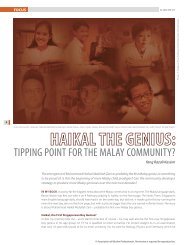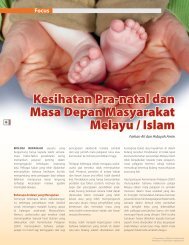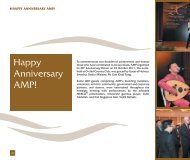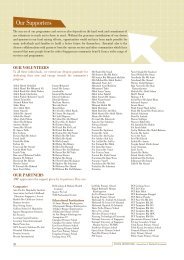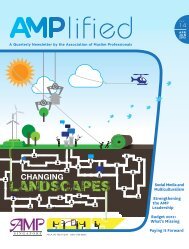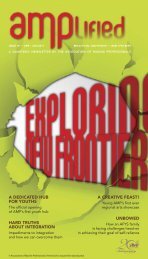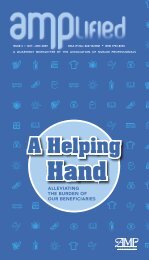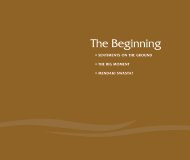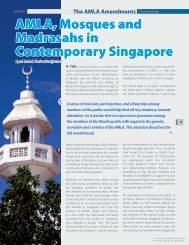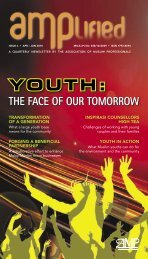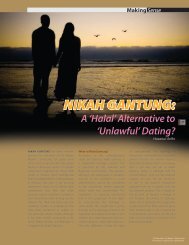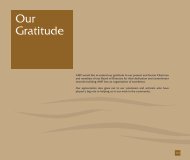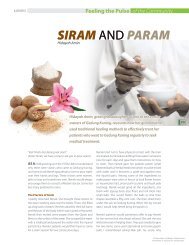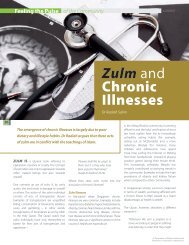The AMLA Amendments - Association of Muslim Professionals
The AMLA Amendments - Association of Muslim Professionals
The AMLA Amendments - Association of Muslim Professionals
Create successful ePaper yourself
Turn your PDF publications into a flip-book with our unique Google optimized e-Paper software.
KARYAWAN <strong>The</strong> <strong>AMLA</strong> <strong>Amendments</strong> Socio-Economy<br />
‘If an overseas individual sets up a trust for his family, why should <strong>AMLA</strong> get involved As we go<br />
forward, and as we make Singapore a wealth management centre, this change must be made. ‘<br />
Estate and Financial Planning<br />
<strong>The</strong> second point looks at the change in demographics. Singapore<br />
<strong>Muslim</strong>s as a group today have more wealth than they used to.<br />
<strong>The</strong>y have funds that they accumulate. <strong>The</strong>re is a need for financial<br />
management and estate planning for their funds. <strong>Muslim</strong>s are not<br />
able to have access to financial advisers who could help them in the<br />
financial management <strong>of</strong> their assets because the rules are not clear.<br />
Certain parts <strong>of</strong> <strong>AMLA</strong>, such as the Financial Provisions in Part IV are<br />
not clear. <strong>The</strong> rule is that a person can only will away one third <strong>of</strong> his<br />
asset – that is sacred because the one-third rule is specified in the<br />
Quran. It cannot be changed. However, a <strong>Muslim</strong> can plan to give<br />
away his property before he dies so that it can be excluded from<br />
the property that passes on death. <strong>The</strong>re is a lot <strong>of</strong> scope for good<br />
financial planning for <strong>Muslim</strong>s.<br />
Provisions <strong>of</strong> <strong>AMLA</strong> have to be clarified to ease financial planning.<br />
Fatwas have to be made public. <strong>The</strong>re must be clarity on financial<br />
planning for <strong>Muslim</strong>s.<br />
A group <strong>of</strong> pr<strong>of</strong>essionals are currently involved in a project to raise<br />
awareness on the scope <strong>of</strong> <strong>Muslim</strong> financial planning among the<br />
practitioners, such as financial advisors and lawyers. <strong>The</strong> intention<br />
is to better equip them to advise the <strong>Muslim</strong> public on the various<br />
ways that financial planning could be achieved without contravening<br />
Islamic principles which are sacred. Through this education, the<br />
financial planning practitioners will be better able to advise the<br />
<strong>Muslim</strong> public on estate planning.<br />
administrator. (See Section 116 and 117 <strong>of</strong> <strong>AMLA</strong>) Why Surely she is<br />
the best person to be the administrator. This is not about entitlement<br />
to the estate – it is simply about distributing it according to the<br />
wishes <strong>of</strong> the deceased.<br />
If previously she was not educated, you could say she could be<br />
excluded. But if she is educated, why should she be excluded<br />
Perhaps she cannot get all <strong>of</strong> the money – because that has to go<br />
according to <strong>Muslim</strong> law. But surely she should have every right to<br />
be the administrator.<br />
Another example is Section 125 <strong>of</strong> <strong>AMLA</strong> – if the husband has a<br />
debt and the creditors come to the house, all the household goods<br />
are deemed to belong to the husband. Why Women now work<br />
and buy many things for the house as well. How can <strong>AMLA</strong> then<br />
presume that everything in the household is deemed to belong to<br />
the husband <strong>The</strong>se provisions may have been relevant in 1966, but<br />
today <strong>Muslim</strong> women are different. In many instances, household<br />
items are bought by the women from their own money. So I feel that<br />
this is an area that we need to look at.<br />
To summarise: First, we have to look at the changes in the community<br />
as a result <strong>of</strong> Singapore’s globalisation. Second, the changes as a<br />
result <strong>of</strong> <strong>Muslim</strong>s becoming richer in Singapore. Third, recognising<br />
that <strong>Muslim</strong> women today are major contributors to the household,<br />
the gender biased provisions in <strong>AMLA</strong> need to be reconsidered.<br />
15<br />
<strong>Muslim</strong> Women in <strong>AMLA</strong><br />
My third point is that <strong>AMLA</strong> should cater for the change that<br />
has taken place with <strong>Muslim</strong> women in Singapore. <strong>The</strong>y are no<br />
longer just homemakers. <strong>The</strong>y are educated and are financially<br />
independent. Yet if you look at the provisions regarding inheritance<br />
and estate planning in <strong>AMLA</strong>, they do not reflect these changes. For<br />
example, if a husband dies, the wife can be excluded from being the<br />
Arfat Selvam is a lawyer and the Managing Director <strong>of</strong> the law<br />
practice, Arfat Selvam Alliance LLC (ASA). She has over 30 years<br />
experience in corporate finance. ASA specialises in corporate law<br />
and serves multinational corporations, banks and other financial<br />
investors. <strong>The</strong> Karyawan Forum was held at AMP on 25 October 2008.



